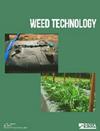Glyphosate-resistant and susceptible downy brome (Bromus tectorum) management with soil-applied residual herbicides
IF 1.7
3区 农林科学
Q3 AGRONOMY
引用次数: 0
Abstract
Downy brome is a cleistogamous facultative winter-annual grass weed that invades cropland, pastureland, and ruderal areas in western North America. Glyphosate-resistant downy brome, the first known glyphosate-resistant grass weed in Canada, was confirmed in a glyphosate-resistant canola field in southern Alberta in 2021. A controlled-environment study was conducted to determine the impact of preemergence soil-applied residual herbicides on glyphosate-resistant and susceptible downy brome in two field soils. Flumioxazin/pyroxasulfone (70/89 g ai ha用土壤施用的残留除草剂管理抗草甘膦和易感的绒毛草(Bromus tectorum)
绒毛穗禾本科杂草(Downy brome)是一种冬性一年生禾本科杂草,入侵北美西部的耕地、牧场和灌丛地区。2021 年,在阿尔伯塔省南部的一块抗草甘膦油菜田里证实了抗草甘膦绒毛穗草,这是加拿大第一种已知的抗草甘膦禾本科杂草。一项受控环境研究旨在确定两种田间土壤中芽前土壤施用的残留除草剂对草甘膦抗性和易感绒毛膜禾本科杂草的影响。氟草胺/吡唑砜(70/89 克/公顷-1)、氟虫腈/吡唑砜(18/150 克/公顷-1)、磺草酮/吡唑砜(100/100 或 150/150 克/公顷-1)和氟虫腈/吡唑砜(36/120 克/公顷-1)在处理后 8 周(WAT)均能产生极佳的可见控制效果(≥90%)并减少绒毛丛草的生物量。低剂量的氟虫腈/吡嘧磺隆(12/100 克/公顷-1)可获得良好的可见防治效果(≥80%),并在 8 WAT 后减少生物量,而中低剂量的氟虫腈/吡嘧磺隆(18/60 或 25/84 克/公顷-1)可使生物量减少≥80%,但根据可见防治效果,其抑制率仅为 66% 至 75%。在沙质壤土中,单用氟吡甲禾灵(105 g ai ha-1)可在 8 WAT 期获得良好的可见防治效果(81%),但在粘壤土中的防治效果较差(13%)。土壤类型会影响植物的生长,未经处理的沙质壤土与粘壤土相比,植物生长量有所降低。草甘膦抗性种群的出现和生长比草甘膦敏感种群更旺盛,导致未处理的对照组和一些除草剂效果较差的处理组中的植物密度更大。这些结果表明,原卟啉原氧化酶抑制性除草剂与超长链脂肪酸伸长酶抑制剂吡嘧磺隆的混合物在萌芽前施用,施用量≥89 g ai ha-1,可以成为针对抗草甘膦和易感绒毛草的除草剂分层策略的有效组成部分。
本文章由计算机程序翻译,如有差异,请以英文原文为准。
求助全文
约1分钟内获得全文
求助全文
来源期刊

Weed Technology
农林科学-农艺学
CiteScore
2.90
自引率
21.40%
发文量
89
审稿时长
12-24 weeks
期刊介绍:
Weed Technology publishes original research and scholarship in the form of peer-reviewed articles focused on understanding how weeds are managed.
The journal focuses on:
- Applied aspects concerning the management of weeds in agricultural systems
- Herbicides used to manage undesired vegetation, weed biology and control
- Weed/crop management systems
- Reports of new weed problems
-New technologies for weed management and special articles emphasizing technology transfer to improve weed control
-Articles dealing with plant growth regulators and management of undesired plant growth may also be accepted, provided there is clear relevance to weed science technology, e.g., turfgrass or woody plant management along rights-of-way, vegetation management in forest, aquatic, or other non-crop situations.
-Surveys, education, and extension topics related to weeds will also be considered
 求助内容:
求助内容: 应助结果提醒方式:
应助结果提醒方式:


